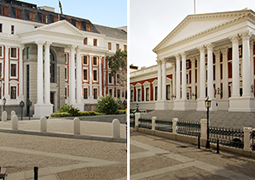
Parliament seeks to provide essential clarifications, crucial for the accurate understanding and communication of the roles, functions, and events within our institution. These clarifications are imperative in preserving the integrity of our constitutional democracy and ensuring that the public, media, and other stakeholders have a clear and correct understanding of our parliamentary processes.
1. CORRECT TITLE FOR PRESIDING OFFICERS OF THE PARLIAMENT
Over an extended period, Parliament has observed a consistent and growing erroneous use of the title “Speaker of Parliament” when referring to the Presiding Officer of the National Assembly. The correct title is “Speaker of the National Assembly.” This inaccuracy has persisted across various sectors of our society.
This error, while often perceived as harmless or colloquial, has escalated to the point where it risks becoming entrenched in the public consciousness as an acceptable reference. This misrepresentation overlooks the specific constitutional functions and structures of our bicameral Parliament, as stipulated in our Constitution.
Section 42 of our Constitution clearly outlines that Parliament consists of two distinct Houses – the National Assembly and the National Council of Provinces (NCOP). Each plays a vital role in the legislative process, representation, and governance of our country. The National Assembly is elected to represent the people and to ensure government by the people under the Constitution. The National Council of Provinces represents the provinces to ensure that provincial interests are considered in the national sphere of government.
According to Section 52 and Section 64 of the Constitution, the National Assembly and the National Council of Provinces are each presided over by their respective heads, elected from among their members – the Speaker of the National Assembly and the Chairperson of the National Council of Provinces.
The constant reference to the head of the National Assembly as the “Speaker of Parliament” is not only constitutionally incorrect but also implies a unicameral legislative system, which South Africa does not have. Such a misunderstanding diminishes the critical roles and representation of both Houses in our bicameral system and the significant position of the NCOP and its Chairperson.
Parliament finds it imperative to address this error publicly, especially among key societal players, in the interest of upholding the integrity and understanding of our constitutional democracy.
We urge all role-players, especially those in influential positions, to make a concerted effort to use the correct titles when referring to our parliamentary officers. While unusual, this endeavour to issue a public clarification on this is essential in preserving the constitutional fidelity and the distinct roles of each House in our legislative and governance processes.
2. CORRECT REFERENCE REGARDING "STATE OF THE NATION ADDRESS" and "OPENING OF PARLIAMENT ADDRESS"
Over the years, there has been an interchangeable use of the terms "State of the Nation Address" and the "Opening of Parliament Address" when referring to annual addresses delivered by the President to the joint sitting of the two Houses of Parliament. While similar in format, these events hold distinct constitutional and ceremonial significance. In November last year, Parliament, through its Joint Rules Committee, took decisive steps to clarify the distinction between these two addresses by amending its joint rules.
Under the revised rules, the "State of the Nation Address" refers to the annual event every February, where the President calls for a joint sitting of Parliament to outline the government's key policies and plans for the year ahead. On the other hand, the "Opening of Parliament Address" is a more singular event, occurring only once every five years, immediately following National and Provincial Elections. This address, also delivered by the President at a joint sitting, is distinctively known as the "Opening" of Parliament as it serves as the official inauguration of the new five-year term of Parliament, marking the beginning of a new legislative cycle and setting the agenda for the forthcoming term.
This differentiation is crucial for both the understanding of parliamentary procedures and for the accurate reporting of these significant national events.
ISSUED BY THE PARLIAMENT OF THE REPUBLIC OF SOUTH AFRICA

